The Funemployment Diaries continue! I’m going to turn the clock back for a couple more entries with more photos from my trip to the Philippines.

On our last day in Bohol, we decided to get up early to meet with the Holy Infant 4, a dolphin-viewing boat at 5:30 in the morning. There’s a fair bit of dolphin activity in the Bohol sea just after the sun rises, and we were hoping to catch a glimpse of these creatures.

The Holy Infant 4 is one of several pontoon boats — I assume the Holy Infants 1 through 3 are among them — that stay moored a short swim away from Alona Beach, ready for varying types of tourist service.

We saw many of these other boats as we made our way northward in search of dolphins.

We looked about for a while in the usual dolphin places, but none were to be found. It was a bit of a windy day, which meant that there was a fair bit of chop to the waters. That meant less small fish and squid — dolphin food — were less likely to be about, and in turn, a lower likelihood of seeing dolphins.

Plan B was to make our way to Virgin Island (Holy Infant, Virgin Island; the Philippines is a very Catholic country), a little atoll with pretty views and shallows where you could get the feeling of standing in the middle of the sea.

It looks a lot like Gilligan’s Island.

It was easy to approach the island: just head straight for it until you got close, cut power, and drag the boat right onto the sand.


Island photo op with your handsome host. If this “computers” fad blows over, perhaps I should see if I can land some kind of show on the Travel Channel or take over hosting The Thirsty Traveler.

A giant sign marked the actual “island” part of the island, the part with the trees, as off-limits. That was all right, as the really interesting stuff was on the sandy reef area that formed a giant crescent around the island.

Free enterprise abounds, even on remote islands, where some locals were already waiting on their boats to sell us shells, starfish and sea urchins.




Another had shot for my portfolio, complete with atoll in the background. Not your standard Facebook self-portrait.

Eventually, it was time to leave the island and make our way back. I took the shot above before hopping back on the Holy Infant 4.

Another Travel Channel-worthy headshot featuring Yours Truly’s rugged yet trustworthy mug. Seriously, Travel Channel, you need me as a host for your next travel adventure series.

A short while later, we made landfall back at Panglao Island’s Alona Beach, where our trip began.

We gave each of the guys a couple of hundred pesos as a tip, and headed for breakfast.

Later that afternoon, we made our way back to Manila. Tagbilaran’s airport is smaller than Toronto’s bus station, as it was built before tourism really picked up on the island of Bohol. The photo above shows the security screening and the airport’s entire set of boarding lounges.
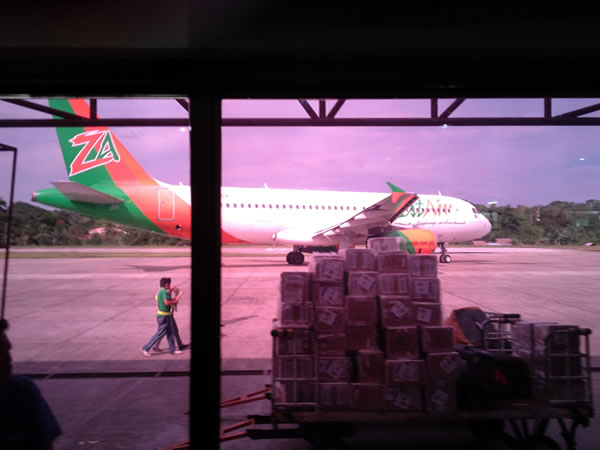
Here’s the view from the lounges. No jetways here. One of the advantages to this approach is that you can actually see your luggage making its way to the plane, which is pretty reassuring.
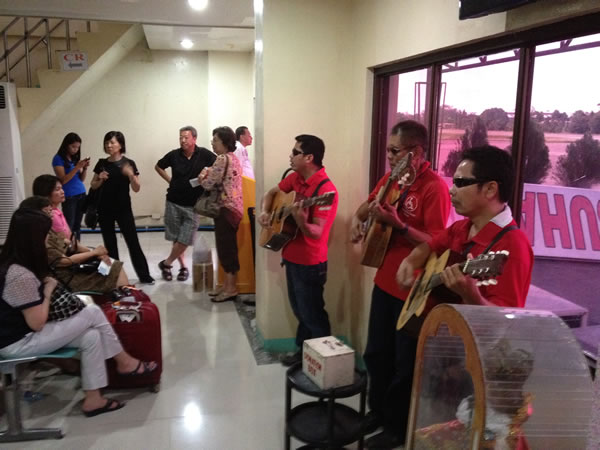
While Tagbilaran airport isn’t going to compete with Hong Kong’s or Schipol, it more than makes up for it with live entertainment. Shortly after a took a spot in the lounge, these guys were guided in (they’re blind, or at least claim to be) and they started playing to the crowd.

At this year’s South by Southwest Conference, celebrity chef Anthony Bourdain talked about how “no matter where you go in the world, there’s always a band of Filipino musicians doing note-perfect rock and pop covers”. These guys carried on that great tradition, doing some great Beatles, Elvis and CCR tunes, even throwing in some two- and three-part harmonies. I was impressed and threw a few hundred pesos in their till.
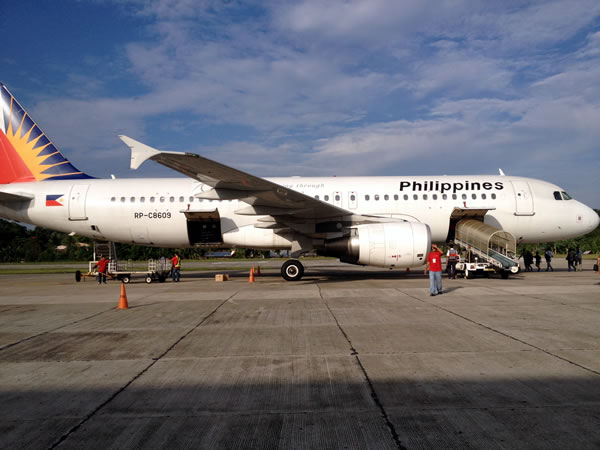
Our plane arrived, and with a quick turnaround, it was our turn to board.
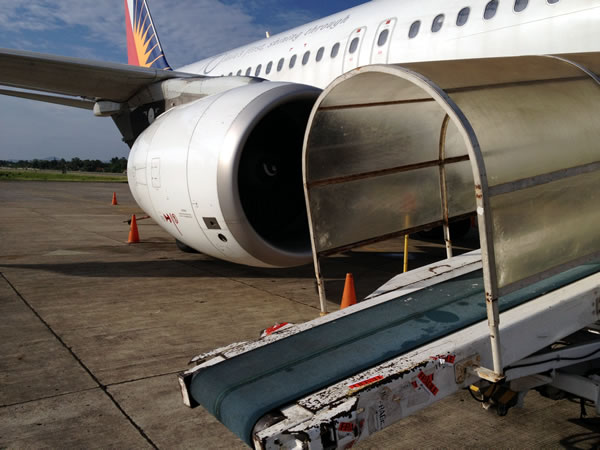
Once again, no jetways here. You walk right up to the plane, and board it via staircase, just like the 1960s. They probably could’ve sped things up by having us help load the cargo bay. “Everybody take a bag, walk it to the plane and put it on the conveyor belt!”
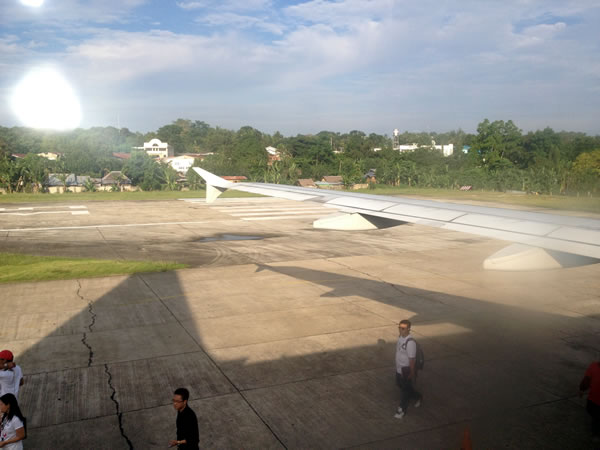
One advantage of boarding from the tarmac is that you can speed up boarding by using both the front and rear doors. Here are the last of the passengers making their way to the back of the plane.
Tagbilaran airport is right in the heart of Tagbilaran City, which means that just past its walls are houses, shops and roads. The local kids like to gather by the chain link fence at the end of the runway to watch planes take off. It’s a double-thrill for them, as jet exhaust is incredibly powerful; just before the plane spun around to do its takeoff run, I saw a bunch of them get a good grip on the fence as they girded themselves to see if they could take the hurricane-force winds from the engines.
Here’s the safety video we were treated to just before takeoff. Philippine Airlines has a pretty good safety video.
(Who knew that Barack Obama had a side gig as an actor?)
A couple of days later, we went to another beach, this time in Laiya (La-EEE-yah) in Batangas province, a couple of hours’ drive from Manila.

As with Alona Beach, there were a number of places to grab a bit quite close to the water, and there were some pretty spectacular views.


We stayed at White Cove resort for the night, and in the morning, we properly hit the beach.

The mountains in the distance were the source of a slang expression that you’ve probably used: boondocks or “boonies”. It’s derived from the Tagalog word bundok, which means “mountain”. The mountains were a fair distance away from Manila, so the American soldiers stationed in the Philippines during World War II started used the Filipino word for them as a way of saying “the middle of nowhere”.

It was less windy at Laiya than Bohol. In fact, there was so little wind that the waves were almost non-existent. It made the beach quite good for swimming, snorkeling and diving.

For a few hundred pesos, you could get a guy to give you an inflatable “banana boat” tour of the surrounding sea.


Take a look at that water!

I wasn’t going to turn down a chance like this, so I caught the next “banana boat” ride, and it was lots of fun. I’m not sure you could offer this sort of ride in North America, what with all the legal liabilities and costs. For the price of a Big Mac, I got a very fun 20-minute ride and a good look at the beaches in the area.

With the “banana boat” ride complete, I got in a little more swimming and took some photos before it was time to leave.

The beaches and resorts in Batangas province are still relatively new, and if you have the chance, you should check them out before they become too popular. They’re still relatively uncrowded and inexpensive, but they may not stay that way for long.
(It also helps if you come during low season, when the rainy season begins. There are still lots of sunny breaks during that time.)

I’m definitely coming back.